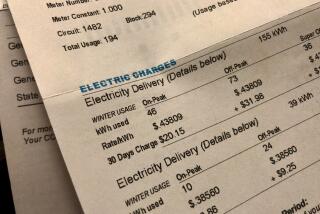Enron Role in Pricing Scrutinized
WASHINGTON — Federal energy regulators said Tuesday that they would investigate whether Enron Corp. used its market clout last year to artificially inflate long-term electricity prices on the West Coast by as much as 30%.
An analysis by Portland, Ore., energy analyst Robert McCullough found a 30% drop in the so-called forward price of electricity Dec. 3, the day after Enron filed for bankruptcy.
Enron was a heavy trader in electricity forward price contracts, which are contracts for the purchase of a certain amount of power to be delivered in a few months or a few years, depending on the contract. Utilities, traders and large energy users buy such contracts to hedge against future changes in the price of electricity.
The unusual drop suggested that Enron had been using its dominance in the thinly traded, unregulated market to prop up prices, McCullough told the Senate Energy and Natural Resources Committee, one of several congressional committees investigating Enron’s collapse.
Other energy experts agreed that Enron appears to have wielded considerable clout in the forward market, where the company is believed to have handled a large percentage of the trades. But they said too little is known about the market to conclude that Enron acted improperly and noted that prices already were falling by the time Enron filed for bankruptcy.
Even so, McCullough’s assertions immediately caught the attention of three West Coast senators, including Dianne Feinstein (D-Calif.), who long has accused Enron of unjustly profiting from California’s energy crunch. They ordered the Federal Energy Regulatory Commission to investigate the matter.
“That certainly raises questions about whether Enron was manipulating the West Coast market,” said Sen. Ron Wyden (D-Ore.).
An Enron spokesman denied the allegations Tuesday, saying numerous investigations by the FERC and the California Independent System Operator--spurred by last year’s energy crisis--already have concluded that Enron did not use its market power to engage in price manipulation.
“A number of factors influence the price of electricity,” said Karen Denne. “To place price fluctuation on Enron is misdirected.”
FERC Chairman Patrick H. Wood III vowed to look into the matter to determine whether the price swing was caused by Enron or a shortage of supply.
“If it’s a result of scarcity, then you probably would be more uninclined to reform those contracts,” Wood said.
McCullough is managing partner of McCullough Research, whose clients include a number of utilities in the Northwest, corporations with high electricity usage and the California attorney general’s office.
If the assertions of price inflation are true, California and other West Coast purchasers of long-term electricity contracts may have overpaid substantially last year, McCullough said. He noted that at the height of California’s crisis last summer, Gov. Gray Davis spent about $40 billion on such contracts, whose value was based largely on forward contracts.
Feinstein and Sen. Maria Cantwell (D-Wash.) suggested that the FERC or Congress might move to renegotiate or negate those contracts if wrongdoing is proven.
“If, in fact, Enron transactions have distorted that market, and Gov. Davis signed those contracts, there’s a good argument that those generators should be forced to renegotiate those contracts,” Feinstein said.
McCullough said a 30% drop in one-day prices for forward contracts was highly unusual. Other than the Enron Chapter 11 bankruptcy filing, there were no factors that would explain the swing, such as changes in energy operations, hydroelectric supply or fossil-fuel prices, he said.
“The clear implication is that Enron may have been using its market dominance to set forward prices,” said McCullough, whose consulting firm specializes in business and public policy issues.
Because the market for forward contracts is unregulated and firms such as Enron are not required to disclose the terms of their trades, only a government investigation will be able to learn whether Enron manipulated the market, McCullough said. He said he based his price information on anecdotal evidence and surveys of energy traders.
The Senate Energy Committee is debating whether to push for tougher disclosure and oversight rules for energy-trading markets, particularly online activity and over-the-counter derivatives.
“Market transparency is essential to efficient and competitive energy markets,” said Sen. Jeff Bingaman (D-N.M.) who chairs the committee.
The drop in long-term prices for forward contracts contrasts sharply with other energy-trading activities, which were largely unaffected by Enron’s bankruptcy filing.
For example, there were no spikes in the spot market for wholesale electricity prices.
“An examination of daily spot market prices over the past year shows no discernible impacts on electric energy prices on critical dates surrounding the Enron collapse, including around Dec. 2,” when Enron filed for bankruptcy protection, said Lawrence J. Makovich, senior director at Cambridge Energy Research Associates.
But others said energy markets have been aided by mild weather and the recession, which have helped keep prices low. Had Enron collapsed in an environment of rising prices, consumers in New England might have seen costs rise by $1 billion, said William M. Nugent, a Maine utility regulator and president of the National Assn. of Regulatory and Utility Commissioners.
“We were simply and profoundly lucky,” Nugent said.
Congressional investigators, meanwhile, sought additional information that might shed more light on the shredding of Enron documents and on the shadowy partnerships used by the energy company to keep debt off its books. Those partnerships and the questionable accounting practices surrounding them were at the center of Enron’s earnings restatement Nov. 8, when the company revealed $586 million in previously unreported losses over nearly five years. The bankruptcy filing came less than a month later.
Reps. W.J. “Billy” Tauzin (R-La.), chairman of the House Energy and Commerce Committee, and James C. Greenwood (R-Pa.), chairman of the subcommittee on oversight and investigations, asked Enron to turn over a review reportedly conducted by an outside law firm last year on the legality of the partnerships set up by Enron Chief Financial Officer Andrew S. Fastow.
The review, by New York law firm Fried, Frank, Harris, Shriver & Jacobson, reportedly recommended that Enron “halt this practice,” according to the congressmen’s letter to Enron general counsel James Derrick Jr. According to the letter, an Enron attorney, Jordan Mintz, then wrote a memo to company executives “to the same effect.”
Investigators are seeking the report by the law firm, which formerly employed Securities and Exchange Commissioner Harvey L. Pitt.
Michael Rauch, co-managing partner at Fried Frank, declined to comment.
In another development, ABC News reported that Enron has continued shredding documents despite the federal investigations. The firm said the documents were routine papers such as payroll material not covered by subpoenas, but Greenwood said the continued shredding was unacceptable.
Also Tuesday, GOP congressional leaders backed Vice President Dick Cheney’s refusal to make public details of private meetings he and his energy task force held with outside interests, including Enron representatives, while drafting the administration’s energy policy last year.
“I think the GAO is being pressured here on a partisan political basis,” said House Majority Leader Dick Armey (R-Texas).
*
Times staff writer Janet Hook contributed to this report.
More to Read
Inside the business of entertainment
The Wide Shot brings you news, analysis and insights on everything from streaming wars to production — and what it all means for the future.
You may occasionally receive promotional content from the Los Angeles Times.











